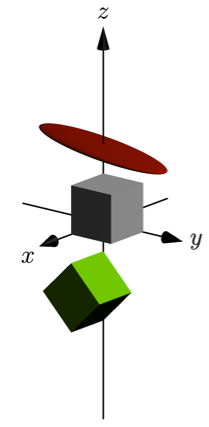Asymptote can draw standard shapes (spheres, cylinders, cubes, etc) which you can then scale, rotate, and shift to create many other shapes.
\documentclass[border=10pt]{standalone}
\usepackage[inline]{asymptote}
\begin{document}
\begin{asy}
import three;
settings.render = 0;
//Setup View
size(200);
currentprojection=orthographic(5,4,2);
//Draw Axes
pen thickblack = black+0.75;
real axislength = 2.0;
draw(L=Label("$x$", position=Relative(1.1), align=SW), -axislength*X--axislength*X,thickblack, Arrow3);
draw(L=Label("$y$", position=Relative(1.1), align=E), -axislength*Y--axislength*Y,thickblack, Arrow3);
draw(L=Label("$z$", position=Relative(1.1), align=N), -2*axislength*Z--2*axislength*Z,thickblack, Arrow3);
//Define cube surfaces
surface c1 = unitcube;
surface c2 = shift(-2Z)*rotate(45,X)*c1;
surface s1 = unitsphere;
surface s2 = rotate(75,Z)*shift(1.5Z)*xscale3(2)*yscale3(0.5)*zscale3(0.1)*s1;
//Draw cube surfaces
draw(c1,palegrey);
draw(c2,green);
draw(s2,red);
\end{asy}
\end{document}
Source: TeX.SE
Author: Chris Chudzicki (License)


